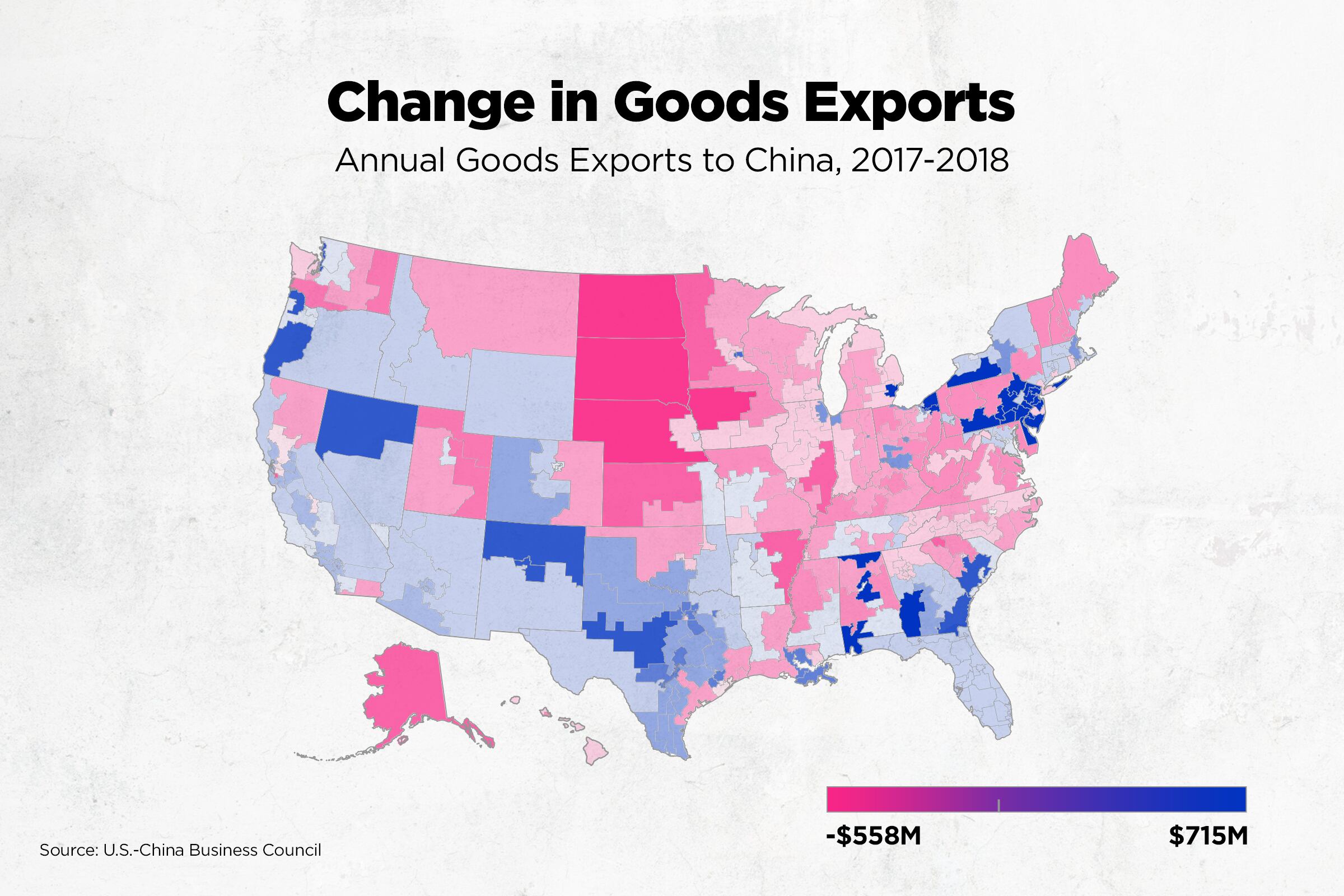The trade war between the U.S. and China found some respite this week after the world's two largest economies began to pull back on the escalating battle over tariffs.
The détente emerged Wednesday after China approved tariff exemptions for a number of U.S. imports and President Trump announced that the U.S. will postpone its forthcoming tariff hikes. On Friday, China further eased tensions by removing several agricultural products, including pork and soybeans, from its list of tariffed U.S. goods.
The welcomed reprieve comes as farmers across the U.S. heartland continue to bear the brunt of the now years-long trade dispute.
"Retaliatory Chinese tariffs on US agricultural goods have caused significant damage in states exporting agricultural goods," the US-China Business Council (USCBC) said in a report released this week. "And have caused potentially long-lasting damage to US competitiveness in the Chinese market."
USCBC, a trade association consisting of over 200 American companies doing business with China, examined the year-over-year change in U.S. exports to China from all 435 U.S. Congressional districts. The districts with the steepest declines were Iowa's 4th, Nebraska's 3rd, and the at-large districts of South and North Dakota — all of which experienced "massive collapses in goods" exported to China from 2017 to 2018.

Iowa's 4th district experienced the sharpest drop with exports falling from $900 million in 2017 to $342 million in 2018. Goods exports, which support over 9,000 jobs in Iowa's 4th, consist primarily of grains, oilseeds, agricultural machinery, and meat, according to USCBC.
Nebraska's 3rd district, which encompasses roughly three quarters of the state and spans two time zones, saw its goods exports to China fall from $900 million in 2017 to $399 million in 2018. Top exports included grains, oilseeds, minerals, animal foods, and meat products.
"Agricultural producers have been hit hard by the ongoing trade tensions with China," Rep. Adrian Smith, the Republican Congressman from Nebraska's 3rd, told Cheddar. "I am certainly no fan of tariffs, however the farmers and ranchers I talk to in my district are happy something is being done to confront China on their unfair trade practices which have been ongoing for decades."
Goods exports to China from South and North Dakota — both of which have single at-large Congressional districts — declined by $526 million and $522 million in 2018, respectively. Both figures represent a roughly 70 percent drop from 2017.
In total, USCBC found that 265 Congressional districts experienced drops in goods exports to China from 2017 to 2018, the vast majority of which were across the Midwest and the Great Plains.
"US goods exports to China slumped last year, with the nation taking a particularly hard punch to its breadbasket," the report noted, adding that farming districts saw "sales to China shrivel as a result of the ongoing and deepening trade conflict."

Moreover, of the top 15 Congressional districts that exported the most goods to China in 2018, nine saw their exports decline compared to 2017 figures, according to USCBC.
Washington's 9th district in the Seattle metropolitan area, for instance, exported $3.5 billion worth of goods in 2018, a 4.4 percent drop from the year prior. California's 17th, which consists of a large swath of the South and East San Francisco Bay Area, exported $3.1 billion worth of goods to China, a decline of 11.5 percent. Both districts primarily export high-tech goods such as aerospace parts, navigational instruments, cars, and computer equipment.
"Most Americans are not aware of how interdependent the two economies are," said Craig Allen, the president of the USCBC. "Cities and states across the US, as well as businesses that pay taxes and employ people there, continue to suffer, especially from loss of sales as a result of punitive tariffs."
Yet farmers in middle America have been hit particularly hard given China's retaliatory tariffs targeting agricultural products. Already, the Trump administration has provided roughly $28 billion in bailouts to support farmers suffering from diminished sales.
With the hiatus materializing this week, many of the U.S. agricultural products that China imposed tariffs on are now exempt and several Chinese firms are reportedly making soybean and pork purchases. Trade proponents are also cautiously optimistic for a breakthrough in negotiations given that U.S. tariffs hikes, which were set to go into effect October 1, are now delayed until October 15.
"I am eager to see President Trump strike a deal," Rep. Smith told Cheddar. "And I will continue to stress the importance of strong trade policy, which benefits U.S. agriculture and consumers around the globe."









